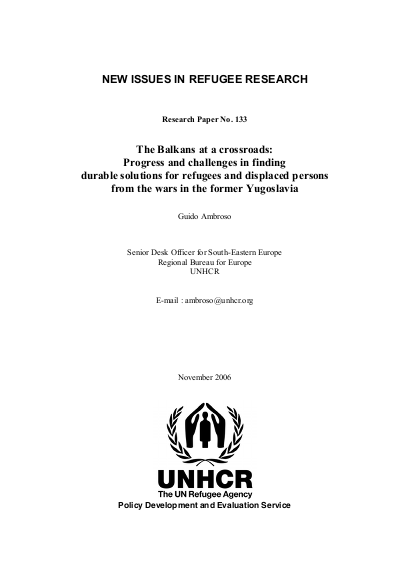
Over ten years after the signature of the Dayton Peace Agreement which ended the wars in Bosnia and Croatia, steady progress has been made in finding durable solutions for the hundreds of thousands of persons displaced by the wars in the former Yugoslavia. By September 2004, returns to and within Bosnia and Herzegovina reached the one million landmark figure. The number of persons in need of durable solutions (refugees and internally displaced) in the former Yugoslavia, which peaked at over two million during the Bosnian crisis in 1992-95 and the Kosovo crisis in 1999, decreased to less than one million by the end of 2003 and to approximately 560,000 by mid-2006. Yet, behind these encouraging trends, the picture is more nuanced. Most of the refugees and internally displaced persons (IDPs) who found durable solutions were those displaced by the wars in Bosnia and Herzegovina and Croatia in the first half of the 1990s. But the majority of the IDPs and refugees who fled the Kosovo province of Serbia and Montenegro after the ousting of the Yugoslav army and the return of the ethnic Albanian majority in mid 1999 are still in their places of displacement and the situation of the minorities remaining in Kosovo is still precarious, as the analysis below shows. From an institutional point of view, there is still some “unfinished business”1 in the Western Balkans: in June 2006 Montenegro declared independence and was admitted to the UN, spelling the end of the State Union of Serbia and Montenegro, a loose confederation that replaced the remnants of the Federal Republic of Yugoslavia. The final status of the Kosovo province of Serbia is also being discussed, in accordance with UN Security Council Resolution (UNSCR) 1244. As result of this situation, UNHCR’s operations in the Western Balkans are centred on two themes: “Post-Dayton” refugees and IDPs (from the wars in Croatia and Bosnia) and refugees and IDPs from Kosovo. A third theme, beyond the scope of this paper, is the development of asylum legislation and procedures in accordance with international standards, in line with UNHCR’s traditional mandate.
